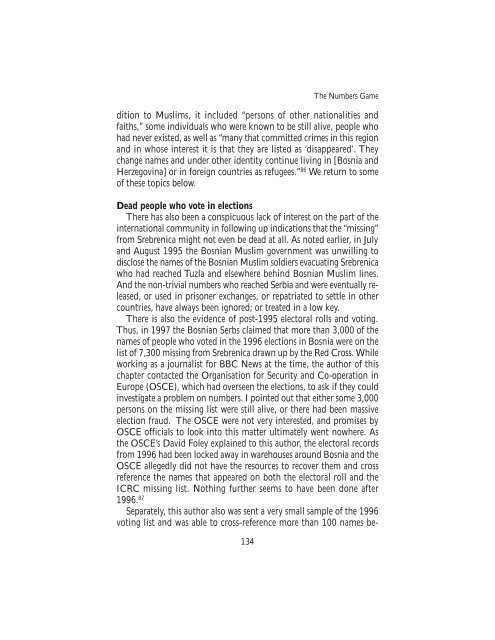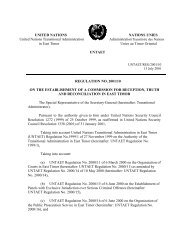The Srebrenica Massacre - Nova Srpska Politicka Misao
The Srebrenica Massacre - Nova Srpska Politicka Misao
The Srebrenica Massacre - Nova Srpska Politicka Misao
Create successful ePaper yourself
Turn your PDF publications into a flip-book with our unique Google optimized e-Paper software.
<strong>The</strong> Numbers Game<br />
dition to Muslims, it included “persons of other nationalities and<br />
faiths,” some individuals who were known to be still alive, people who<br />
had never existed, as well as “many that committed crimes in this region<br />
and in whose interest it is that they are listed as ‘disappeared’. <strong>The</strong>y<br />
change names and under other identity continue living in [Bosnia and<br />
Herzegovina] or in foreign countries as refugees.” 86 We return to some<br />
of these topics below.<br />
Dead people who vote in elections<br />
<strong>The</strong>re has also been a conspicuous lack of interest on the part of the<br />
international community in following up indications that the “missing”<br />
from <strong>Srebrenica</strong> might not even be dead at all. As noted earlier, in July<br />
and August 1995 the Bosnian Muslim government was unwilling to<br />
disclose the names of the Bosnian Muslim soldiers evacuating <strong>Srebrenica</strong><br />
who had reached Tuzla and elsewhere behind Bosnian Muslim lines.<br />
And the non-trivial numbers who reached Serbia and were eventually released,<br />
or used in prisoner exchanges, or repatriated to settle in other<br />
countries, have always been ignored; or treated in a low key.<br />
<strong>The</strong>re is also the evidence of post-1995 electoral rolls and voting.<br />
Thus, in 1997 the Bosnian Serbs claimed that more than 3,000 of the<br />
names of people who voted in the 1996 elections in Bosnia were on the<br />
list of 7,300 missing from <strong>Srebrenica</strong> drawn up by the Red Cross. While<br />
working as a journalist for BBC News at the time, the author of this<br />
chapter contacted the Organisation for Security and Co-operation in<br />
Europe (OSCE), which had overseen the elections, to ask if they could<br />
investigate a problem on numbers. I pointed out that either some 3,000<br />
persons on the missing list were still alive, or there had been massive<br />
election fraud. <strong>The</strong> OSCE were not very interested, and promises by<br />
OSCE officials to look into this matter ultimately went nowhere. As<br />
the OSCE’s David Foley explained to this author, the electoral records<br />
from 1996 had been locked away in warehouses around Bosnia and the<br />
OSCE allegedly did not have the resources to recover them and cross<br />
reference the names that appeared on both the electoral roll and the<br />
ICRC missing list. Nothing further seems to have been done after<br />
1996. 87<br />
Separately, this author also was sent a very small sample of the 1996<br />
voting list and was able to cross-reference more than 100 names be-<br />
134



